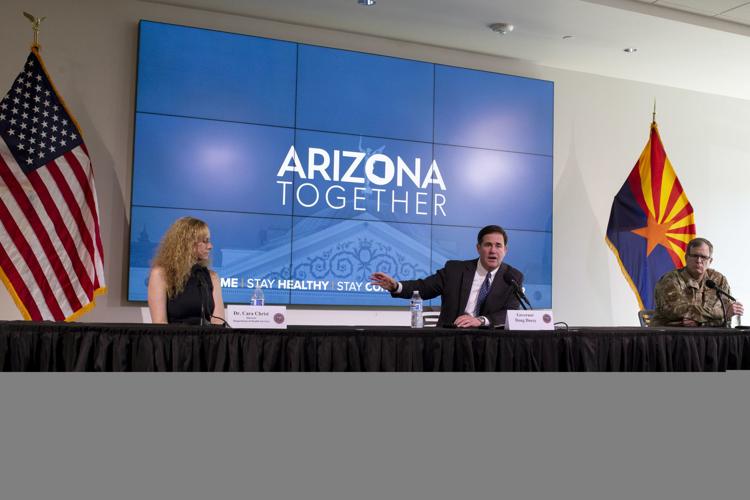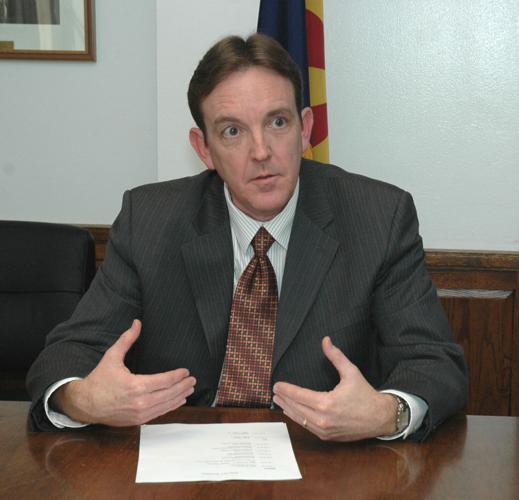PHOENIX — The state Senate was likely just minutes from approving a measure that would ask Arizona voters to OK a constitutional amendment requiring the Legislature to reauthorize any state of emergency called by the governor every 30 days.
Then one lawmaker raised questions that sidelined the proposal, possibly for good.
The plan to refer the measure to voters in 2024 already had been approved by the House and had gone through the Senate’s Rules Committee Wednesday. It was being discussed at the Republican caucus meeting where the majority lawmakers talk about items about to go to the full Senate.
But then Sen. Ken Bennett sent for his laptop computer so he could look closely at the bill. He quickly started questioning its workability.
And as his concerns grew, a handful of other majority GOP lawmakers who hadn’t thought hard about the bill joined him.
If sent to the ballot and approved by voters, House Concurrent Resolution 2039 would have far-reaching effects on how the state oversees disaster declarations and would impact tens of millions of dollars in federal funding. Many of those declarations can last for years, not because a fire is still burning or floodwaters are still inundating homes, but because the declaration must remain open in order to fund the repairs and rebuilding.
As of Jan. 17, Arizona had 41 open state disaster declarations, each relying on an emergency being declared by the governor, according to the state Department of Emergency and Military Affairs.
It can and often does take years, sometimes even decades, for a disaster to be closed. An open declaration is needed to qualify for federal emergency funding.
“They certainly don’t need the Legislature coming into a special session every 30 days to decide whether to extend them for another 30 days,’’ said Bennett, a Prescott Republican.
Pandemic fallout
Fueling this debate now is Republican lawmakers’ anger over school and business closures ordered by former Gov. Doug Ducey in early 2020 when the pandemic hit the state.
Last year, the GOP-controlled Legislature responded by sharply limiting a governor’s ability to call public health emergencies. Ducey, also a Republican, signed it — but only after it was crafted to take effect when he left office in early January, and Democratic Gov. Katie Hobbs became governor.
Now, any health emergency is limited to 120 days. After that, the Legislature would need to approve an extension every 30 days.
HCR 2039 grew out of the desire of most Republican lawmakers to greatly expand that law to cover not just health but all emergency declarations — most often used after fires or floods — and enshrine it in the Arizona Constitution.
But after an hour of what one GOP senator called a “robust’’ discussion prompted by Bennett’s questions, the bill was put on hold — indefinitely — by Senate President Warren Petersen so a “working group’’ could figure out whether it can be changed enough to be feasible, Bennett said.
Bennett said he knows Republicans are sore about the closures brought on by the pandemic, but that’s a rare instance.
“It’s obviously trying to deal with the COVID situation,’’ he said. “And, you know, if every emergency was a massive statewide emergency and governors were shutting down businesses and schools and on and on and on, then those types of emergencies might need an outside look from the Legislature periodically.’’
But there are dozens of state emergencies every year or two, and most are small localized things like a wildfire or monsoon flooding. Just in the past two years, there have been 21 state and eight federal emergency declarations.
Ballot referrals
Democrats on the Senate Government Committee had brought up the problem of having to renew dozens of open disaster declarations each month. They noted that having to do so would put the part-time Legislature in a state of permanent special session.
Last week, House Democrats put out a news release warning “against the reckless use of ballot referrals by Legislative Republicans to appease a small fringe of the alt-right.’’
“The reality is that once a state of emergency is called it slips quickly from the media and the minds of the public,’’ the Democrats’ release said. “However, the lasting effects are ongoing and deeply personal for millions of Arizonans.’’
It went on to list the more than three dozen open disaster declarations, the oldest dating to 1991 and covering statewide search and rescue efforts not linked to any event.
Sen. J.D. Mesnard, R-Chandler, said he supports the concept of putting limits on statewide emergencies in the constitution, where different legislatures and governors can’t change it. But he said once he learned in the caucus meeting of the number of emergency declarations and their impact, he had second thoughts.
“I think all that was news to people,’’ Mesnard said.
“The premise behind the bill, especially as it relates to COVID-type situation, I strongly support,’’ he said. “We just want to make sure we’re not sweeping in things that make it either a challenge to sell to the voters or just a logistical challenge to fulfill as legislators.’’
Get your morning recap of today's local news and read the full stories here: http://tucne.ws/morning







